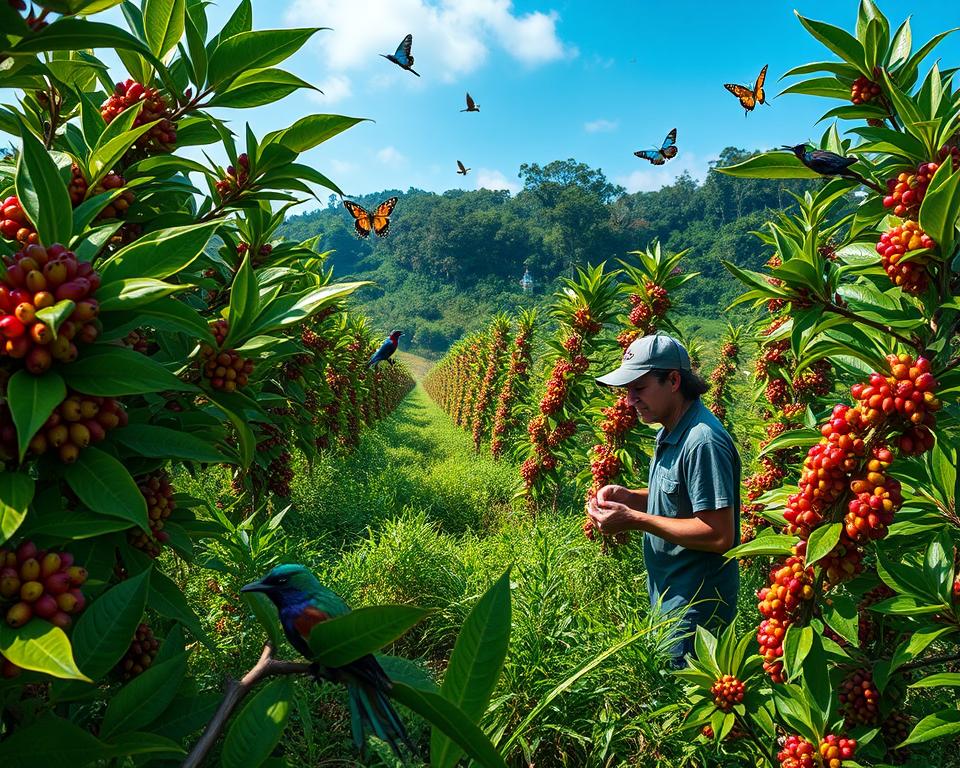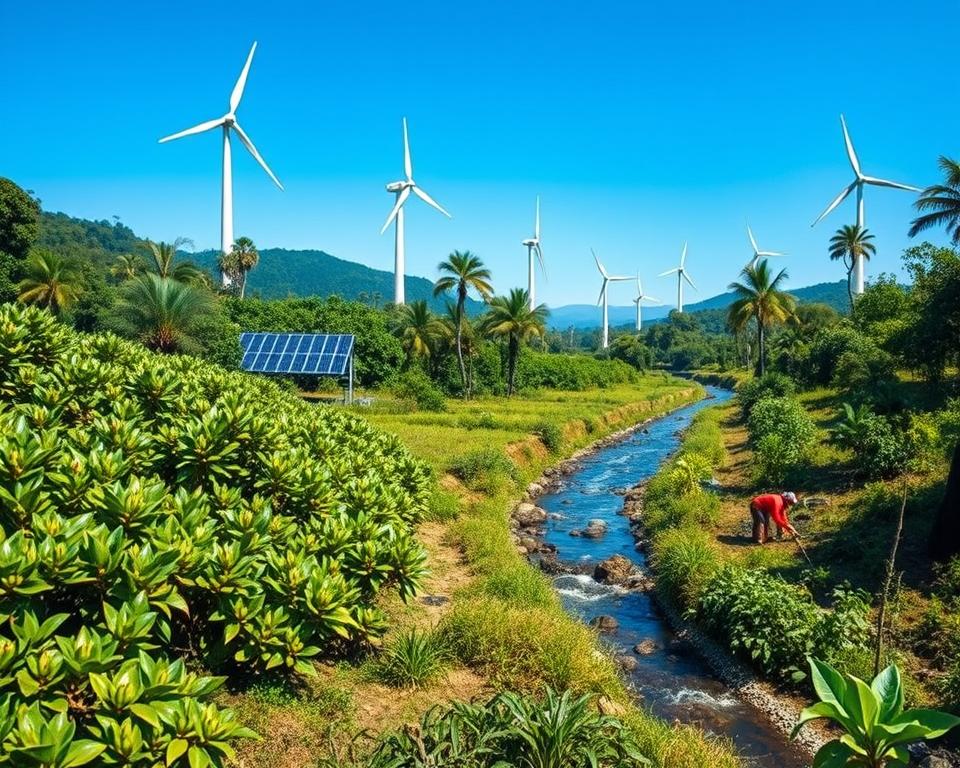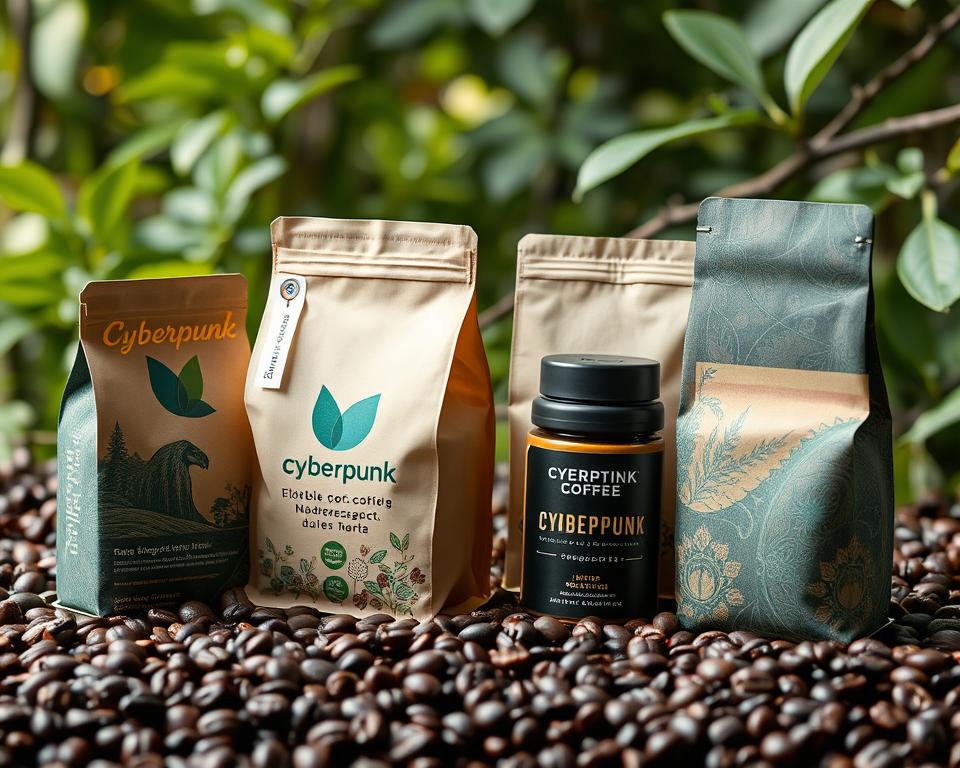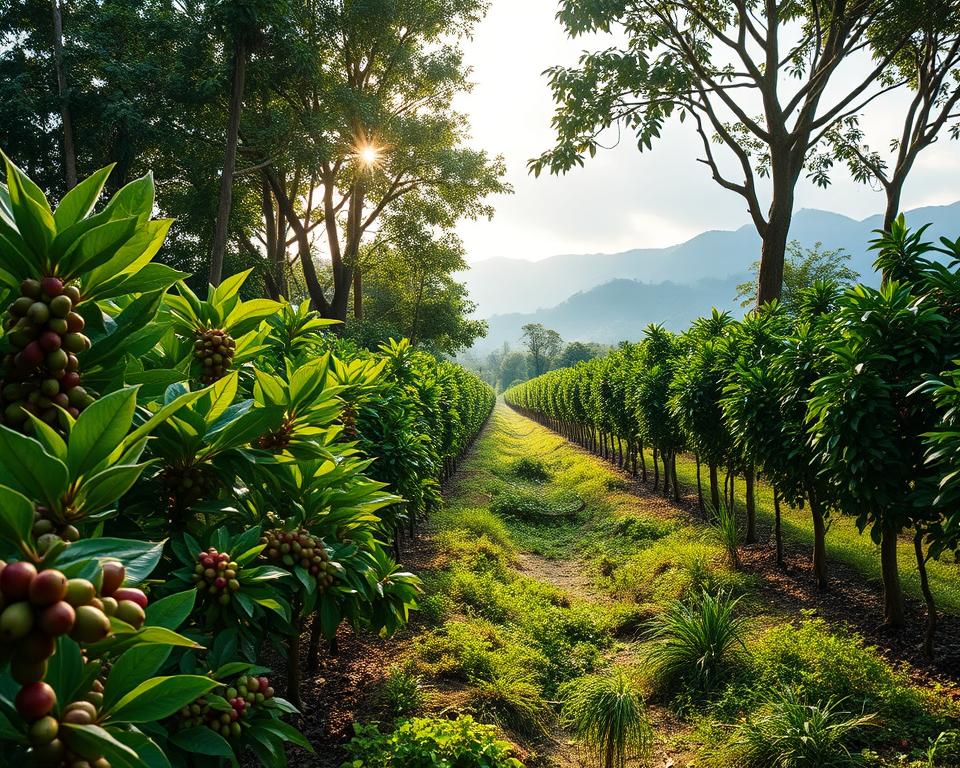Ever wonder what choosing fair trade coffee actually means? It’s much more than a simple label. When you pick fair trade coffee, you choose ethical drinking, sustainable growing, and social responsibility.
Fair trade’s strict standards ensure farmers get fair prices. This way, they enjoy economic stability and better lives. Seeing farmers thrive due to fair trade is truly inspiring. It means less poverty in their communities.
On top of that, fair trade is great for our planet. It encourages farmers to farm organically, boosting biodiversity. This process assures the production of top-notch Arabica beans. So, the coffee not only tastes better but also supports the environment.
For us coffee drinkers, choosing fair trade is a smart move. It says we care about fair trade systems worldwide. By supporting stable farmer incomes, we’re helping build a more just and sustainable coffee world.
The Principles Behind Fair Trade Coffee
Fair trade coffee is based on key principles to help farmers and the environment. These ideas go beyond just the beans. They change how economies, the environment, and trade work. Let’s see how these pillars make the coffee business better and fairer.
Economic Empowerment
Economic empowerment is central to fair trade. It ensures coffee farmers get fair pay, protecting them from market changes. According to Fair Trade USA, stable markets are crucial, especially when prices swing a lot. Fair trade sets a minimum price to protect farmers from these swings.
Investments in local infrastructure also boost economic growth in coffee regions. This helps communities become stronger and more resilient.
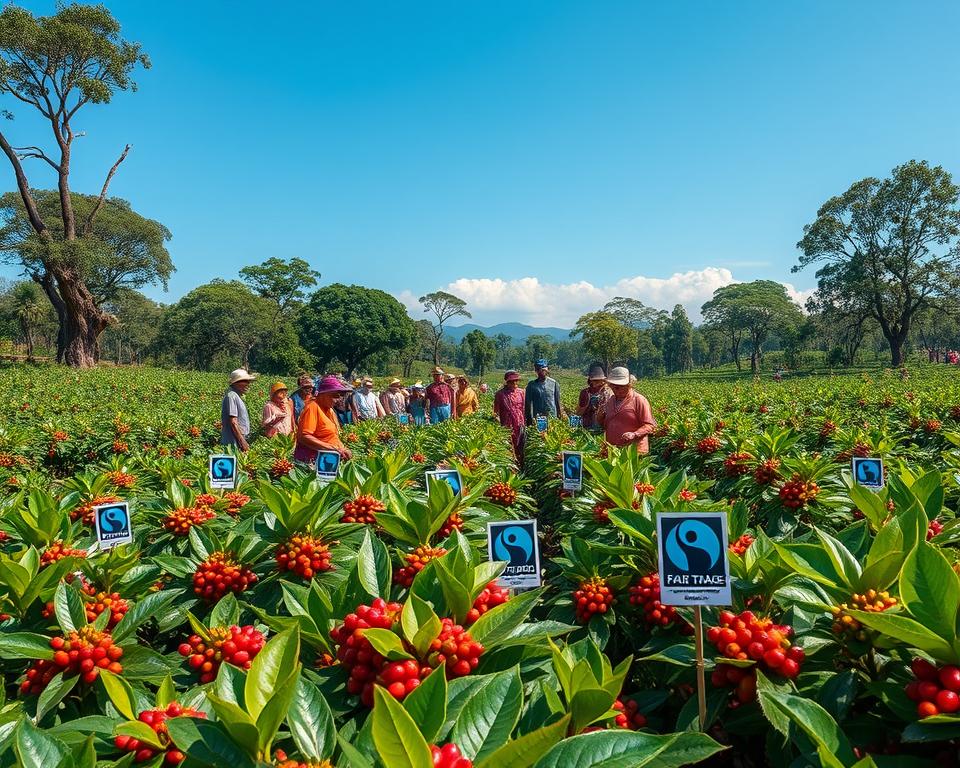
Environmental Stewardship
Environmental care is a big deal in fair trade. Farmers use practices that are good for nature, like organic farming. It helps protect the environment and keep biodiversity alive. The Coffee Barometer Report says these green practices are key for the future.
By putting money into environmental projects, fair trade ensures farming is both productive and green. This benefits everyone in the long run.
Equitable Trade Practices
Equitable trade is another fundamental principle. It’s about direct, lasting ties between producers and buyers. This kind of direct trade creates transparency and trust. It makes sure farmers are paid fairly for their work.
Fair Trade USA points out that technology improves transparency in the supply chain. It helps everyone see the risks and chances better. This approach strengthens local co-ops, giving farmers more power and control over their futures.
How Fair Trade Supports Coffee Farmers
Fair trade coffee helps ensure farmers get paid fairly for their hard work. Most of the world’s coffee is made by small farmers. As a result, fair trade certification is key for them to get a guaranteed minimum price.
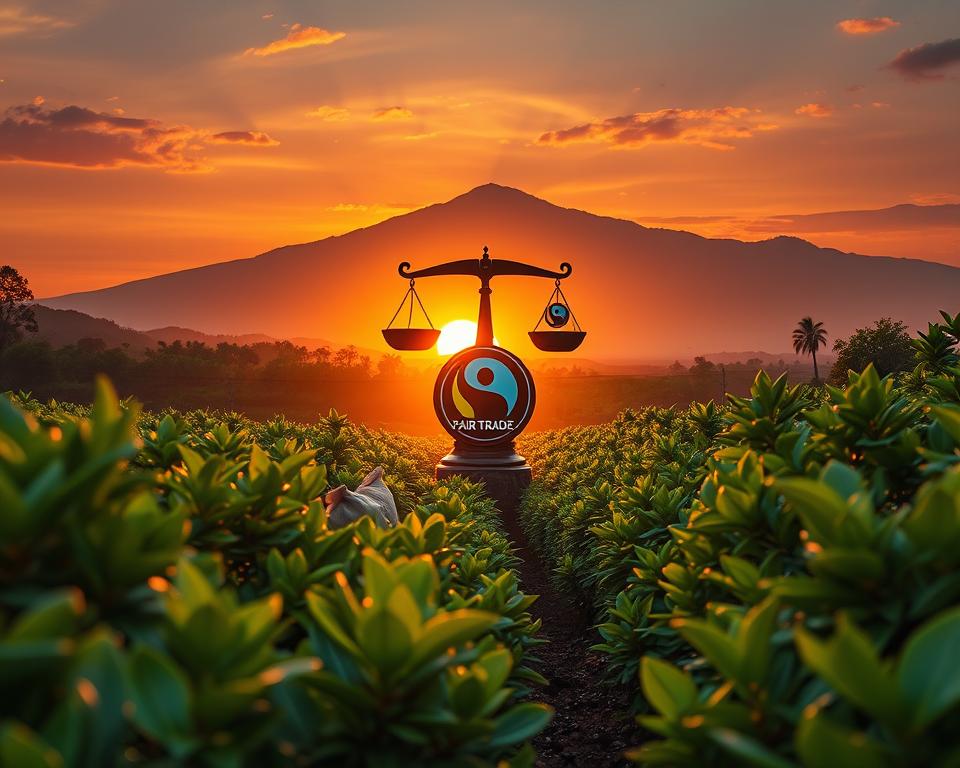
Fair Prices and Premiums
The minimum price guarantee protects farmers from the unpredictable global market. This safety net helps them plan for the future without worry. They also receive extra money, or premiums, which they can use for their farms or community projects. Fairtrade International, set up in the late 80s, makes sure these rules are followed.
Community Development Funds
Premiums from fair trade coffee help fund community projects. These projects focus on improving education, healthcare, and infrastructure. They are essential for the community’s economic well-being, offering a better life and reducing poverty. You can read more about it in this article by Fairtrade.
Improved Living Conditions
Fair trade leads to stable incomes for thousands of farmers in needy areas. Benefits include access to clean water, better houses, and healthcare. This makes farming communities more robust and ready for future hurdles. See the connection between sustainable farming and fair trade in this article.
Fair trade does more than help one farmer – it creates positive changes for many people. With coffee as a multi-billion dollar industry, supporting fair trade can indeed make a big impact.
Environmental Impact of Fair Trade Coffee
Choosing Fair Trade coffee does more than wake you up. It deeply influences saving our planet’s biodiversity, supports making coffee in a way that’s good for the earth, and helps save water.
Organic Farming Practices
Fair Trade coffee usually grows via organic farming. This method avoids harmful chemicals or pesticides, helping keep our biodiversity safe. It also means healthier soil, which is better for our future. These eco-friendly ways of making coffee reflect my dedication to a greener world.
Shade-Grown Coffee and Biodiversity
Shade-grown coffee plays a big role too. It’s grown under native trees, which keeps the forest ecosystems healthy. This setting is perfect for birds, insects, and other animals to flourish. So, it’s a win for keeping our planet’s life diverse and healthy.
Sustainable Water Management
In eco-friendly coffee production, using water wisely is key. Fair Trade standards push for careful and smart use of water resources. This makes sure communities have the clean water they need, for both drinking and farming.
Why Fair Trade Coffee Tastes Better
Fair Trade coffee creates a unique taste. It’s crafted with care to ensure top quality and flavor. This coffee stands out because it’s made with a commitment to good craftsmanship and sustainable practices. As a result, it gives you a superior coffee experience.
High-Quality Arabica Beans
The journey to better flavor begins with the beans. Fair Trade farmers mainly use high-quality Arabica beans. These beans are smooth and rich, offering a unique drinking experience. With these beans, you aren’t just having coffee. You’re enjoying a carefully cultivated mix of tastes.
Sustainable Farming Equals Superior Flavor
Sustainable farming supported by Fair Trade is good for Earth and great for taste. For example, shade-growing lets coffee plants grow slowly under protection. This slow growth leads to a cleaner and more complex taste. Choosing Fair Trade means your coffee grows in the best conditions, boosting its natural qualities.
Small-Batch Processing
With Fair Trade, the focus isn’t only on the beans but also how they’re processed. The coffee is processed in small batches, giving each one special care. This way, there’s a consistent focus on quality. It makes every cup taste better. For more info on how the process affects the coffee, see this comprehensive guide.
Fair Trade Coffee Benefits for Consumers
Choosing fair trade coffee means more than enjoying a great cup. It’s a way to make a big difference. By buying fair trade, we support coffee growers and their communities in a big way. This helps them get fair pay, better living conditions, and fund local projects.
Fair trade also means farming that’s good for the planet. It ensures we’re helping reach global sustainability goals with our choices.
Ethical Consumption
Choosing fair trade coffee is a step towards buying ethically. It means we’re backing companies that care about fair work conditions and the planet. Our buying power can push more companies to act responsibly. Though fair trade coffee is a small part of the market, it’s growing. More of us are choosing products that match our values.
Supporting Global Fair Trade Systems
Supporting fair trade helps small-scale farmers around the world in a big way. Since 1998, fair trade has given over $1 billion to farmers. This shows how much we can help. Yet, there are hurdles like the cost of getting certified and entering the market.
Direct trade can help too. It lets farmers get fair pay directly, making things more transparent and focusing on quality.
Encouraging Informed Choices
Fair trade labels help us shop according to our beliefs. They let us choose products that are good for the world. Knowing the story of our coffee makes us more aware. We see how our choices impact the lives of the people who make our coffee.
This awareness makes fair trade systems better and more effective. It keeps them strong and making a difference.
How Does High Altitude Affect the Quality of Fair Trade Coffee?
High-altitude coffee cultivation results in unique flavor profiles, as cooler temperatures slow maturation, enhancing sweetness and acidity. Farmers benefit from improved quality, making their products more desirable in the market. Thus, exploring advantages of highaltitude coffee reveals not only the rich taste but also its economic viability for producers.
Conclusion
I’ve explored how Fair Trade coffee makes a big difference. From its core values to its benefits, it’s impactful. It helps by ensuring farmers get paid enough to cover costs, leading to a steady income. This, in turn, supports community projects in healthcare, education, and more.
Fair Trade’s impact on coffee farmers is huge. For example, the minimum price per pound is $1.80 as of August 1, 2023. If it’s organic, farmers get an extra $0.40 per pound. These premiums boost community services and living conditions. They also fight against child labor and ensure fair wages and safety at work.
If you love coffee and care about ethics, your choices matter. They promote sustainable farming and better coffee flavor. Plus, they back a market for ethically sourced goods. To learn more, check this blog post on Fair Trade coffee’s importance.
However, Fair Trade isn’t perfect. It faces criticism, like how clearly it shows where money goes and the cost of getting certified. But, the positive impacts, like families earning more and kids going to school more, are significant. By choosing Fair Trade coffee, you help make the coffee world fairer and more sustainable. Every coffee cup you drink can make a positive impact.
FAQ
What are the benefits of choosing fair trade coffee?
When you pick fair trade coffee, you back ethical drink habits, green farming, and responsible coffee making. It ensures that farmers get fair pay, our environment is protected, and the lives of those growing coffee improve.
What principles does fair trade coffee follow?
Fair trade coffee sticks to principles that boost economic growth, protect our planet, and ensure fair deals. These rules make sure farmers and their communities get the right support and practice ethical sourcing.
How does fair trade coffee economically empower farmers?
Fair trade coffee helps farmers by guaranteeing prices, offering stability, and backing local projects. This creates lasting economic growth in their communities.
In what ways does fair trade coffee promote environmental stewardship?
By using organic farming, keeping biodiversity, and managing water wisely, fair trade coffee is kind to our planet. These eco-friendly ways protect the earth’s soil, water, and animals.
How does fair trade coffee ensure equitable trade practices?
Fair trade coffee builds strong, lasting ties between growers and buyers. It encourages cooperative groups, giving farmers more say and a brighter future.
How are fair prices and premiums provided to fair trade coffee farmers?
With fair trade, coffee beans have assured fair prices. This shields farmers from market swings. Extra premiums fund projects for social, economic, and green growth in their areas.
What type of community development is supported by fair trade coffee?
Fair trade money goes into community projects like better schools, roads, and health care. All these contribute to lasting and overall growth in coffee-growing areas.
How does fair trade improve living conditions for coffee farmers?
By ensuring steady pay and reducing poverty, fair trade betters work and home life for farmers. This boosts their quality of life and economic well-being.
What environmental benefits come with fair trade coffee?
Fair trade coffee backs organic farming and shade-grown coffee, which saves biodiversity and bird homes. It also looks after water sources, helping our environment.
Why does fair trade coffee taste better?
Fair trade coffee uses top-notch Arabica beans and green farming, enhancing its flavor. The careful small-batch processing ensures top quality, making it taste great.
What are the benefits of high-quality Arabica beans in fair trade coffee?
Known for their great flavor and scent, high-quality Arabica beans are grown with care under fair trade. This leads to exceptional coffee quality and taste.
How does sustainable farming contribute to the superior flavor of fair trade coffee?
Sustainable farming boosts soil health, keeps biodiversity, and employs organic techniques. These enhance the coffee’s natural flavors, resulting in a delicious cup.
How does small-batch processing affect the quality of fair trade coffee?
With small-batch processing, each batch gets careful attention to detail. This focus ensures every batch is high-quality, offering rich and tasty coffee.
How does fair trade coffee benefit consumers?
Consumers enjoy ethical products by supporting fair trade. It allows them to make conscious choices, aiding global sustainability.
Why is ethical consumption important?
Ethical consumption promotes sustainably made goods, fair trade practices, and farmer and environmental well-being.
How does supporting global fair trade systems make a difference?
Backing global fair trade ensures fair prices, ethical sourcing, and green practices in coffee production. This aids farmers, their communities, and brings a fairer global trade system.
How does fair trade promote informed purchasing decisions?
Fair trade labels give clear info, letting buyers choose based on their values. This raises awareness and support for green and ethical practices globally.

